BBS301 - Murdoch University: Ethical Consumerism Literature Review
VerifiedAdded on 2022/10/19
|10
|1690
|460
Literature Review
AI Summary
This literature review critically analyzes existing research on ethical consumerism and sustainability within the clothing sector, focusing on how companies like Shophere can operate ethically while still driving consumer purchases. The review examines research articles published between 2015 and 2018, using keywords like 'ethics and consumerism' and 'ethical duties in business.' Key findings reveal that consumer values significantly influence purchasing decisions, with increasing consumer expectations for social responsibility in the apparel sector. The review also explores the challenges of balancing cost considerations with ethical and environmental concerns, the 'value-action gap' where pro-environmental beliefs don't always translate into purchasing behavior, and the impact of consumer mindsets on sustainable clothing choices. Ultimately, the review concludes that ethics and sustainability are crucial for businesses in today's environment, with consumers increasingly concerned about the environmental and social impact of their purchases. Desklib offers this and many more solved assignments for students.
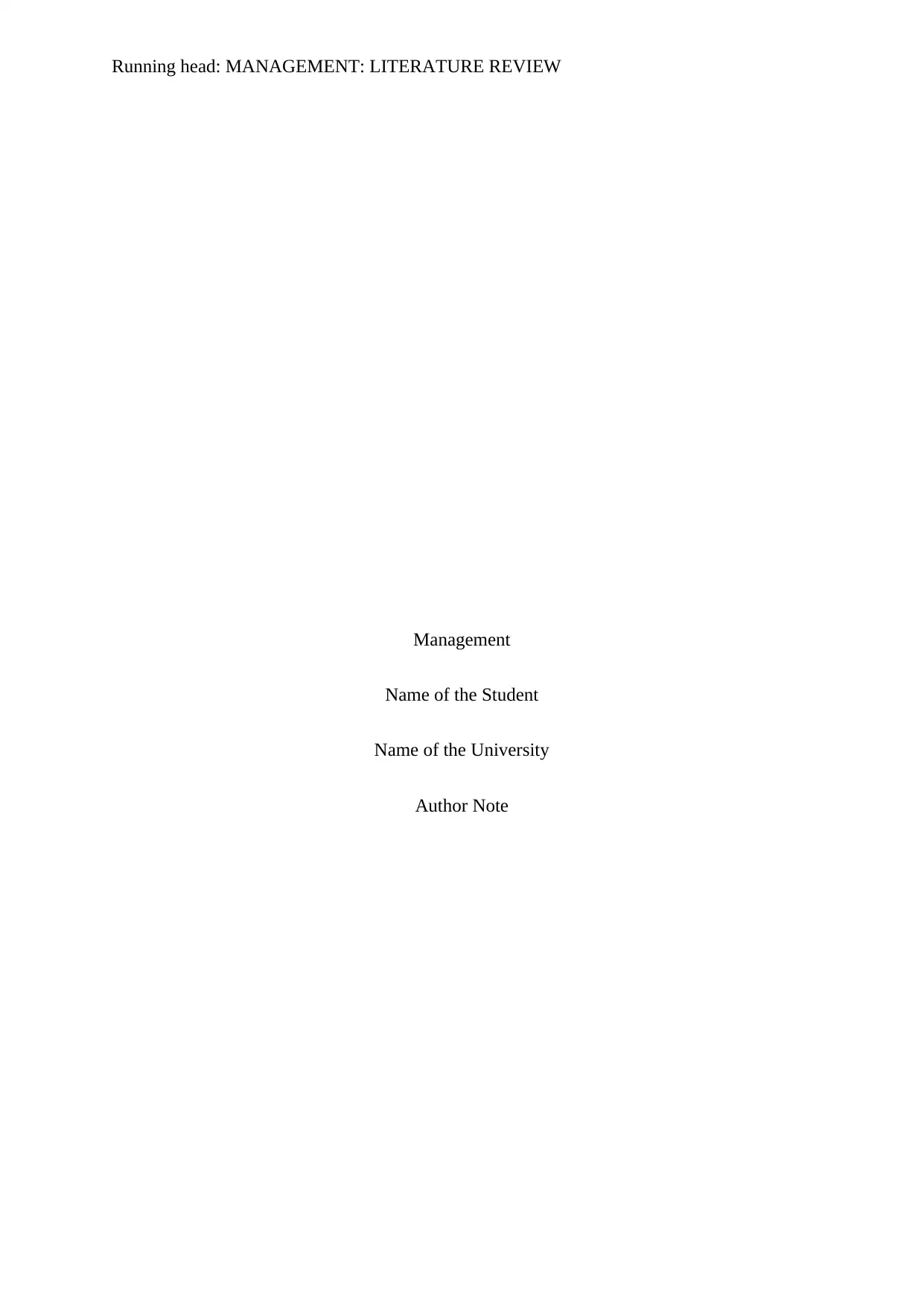
Running head: MANAGEMENT: LITERATURE REVIEW
Management
Name of the Student
Name of the University
Author Note
Management
Name of the Student
Name of the University
Author Note
Paraphrase This Document
Need a fresh take? Get an instant paraphrase of this document with our AI Paraphraser
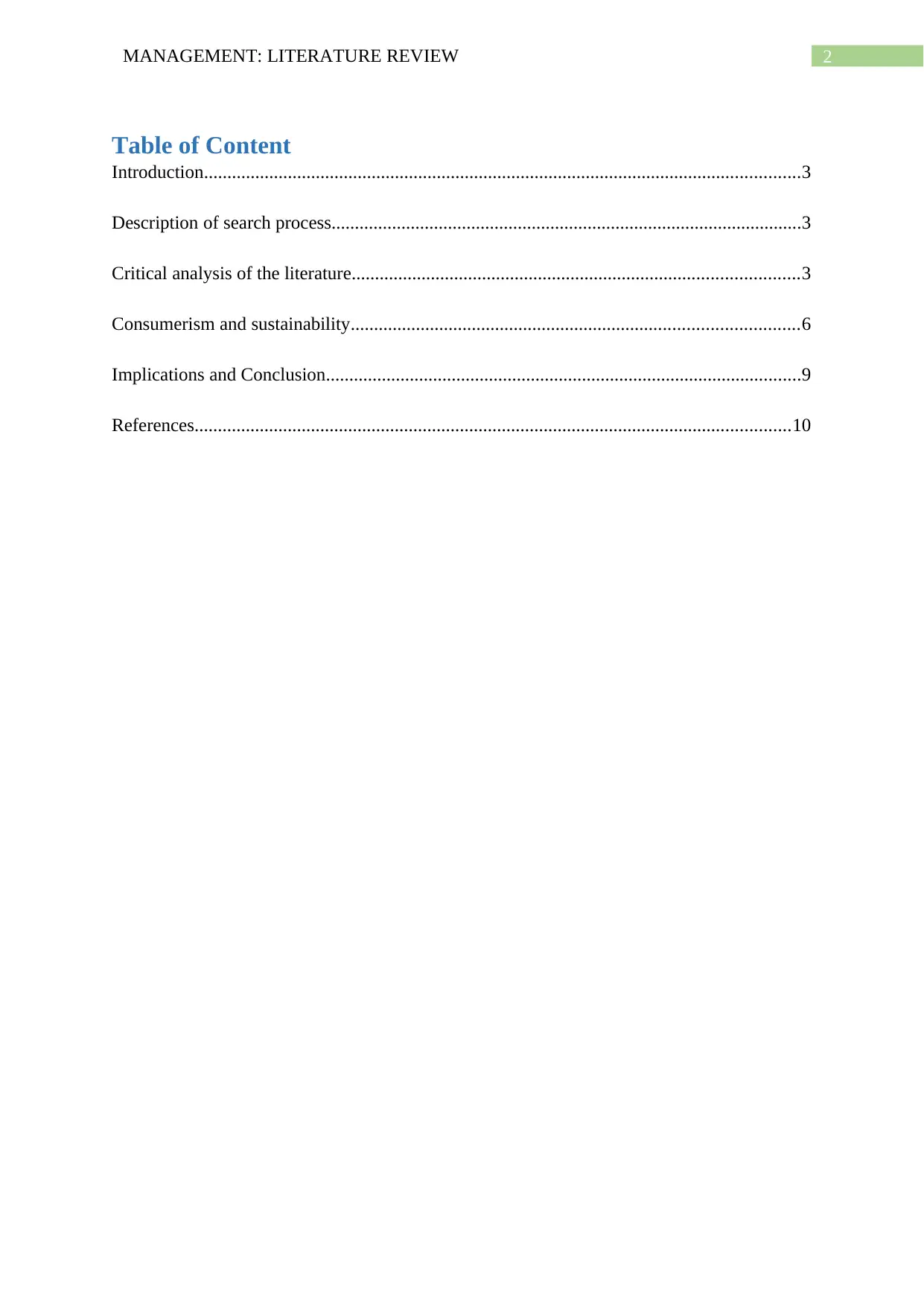
2MANAGEMENT: LITERATURE REVIEW
Table of Content
Introduction................................................................................................................................3
Description of search process.....................................................................................................3
Critical analysis of the literature................................................................................................3
Consumerism and sustainability................................................................................................6
Implications and Conclusion......................................................................................................9
References................................................................................................................................10
Table of Content
Introduction................................................................................................................................3
Description of search process.....................................................................................................3
Critical analysis of the literature................................................................................................3
Consumerism and sustainability................................................................................................6
Implications and Conclusion......................................................................................................9
References................................................................................................................................10
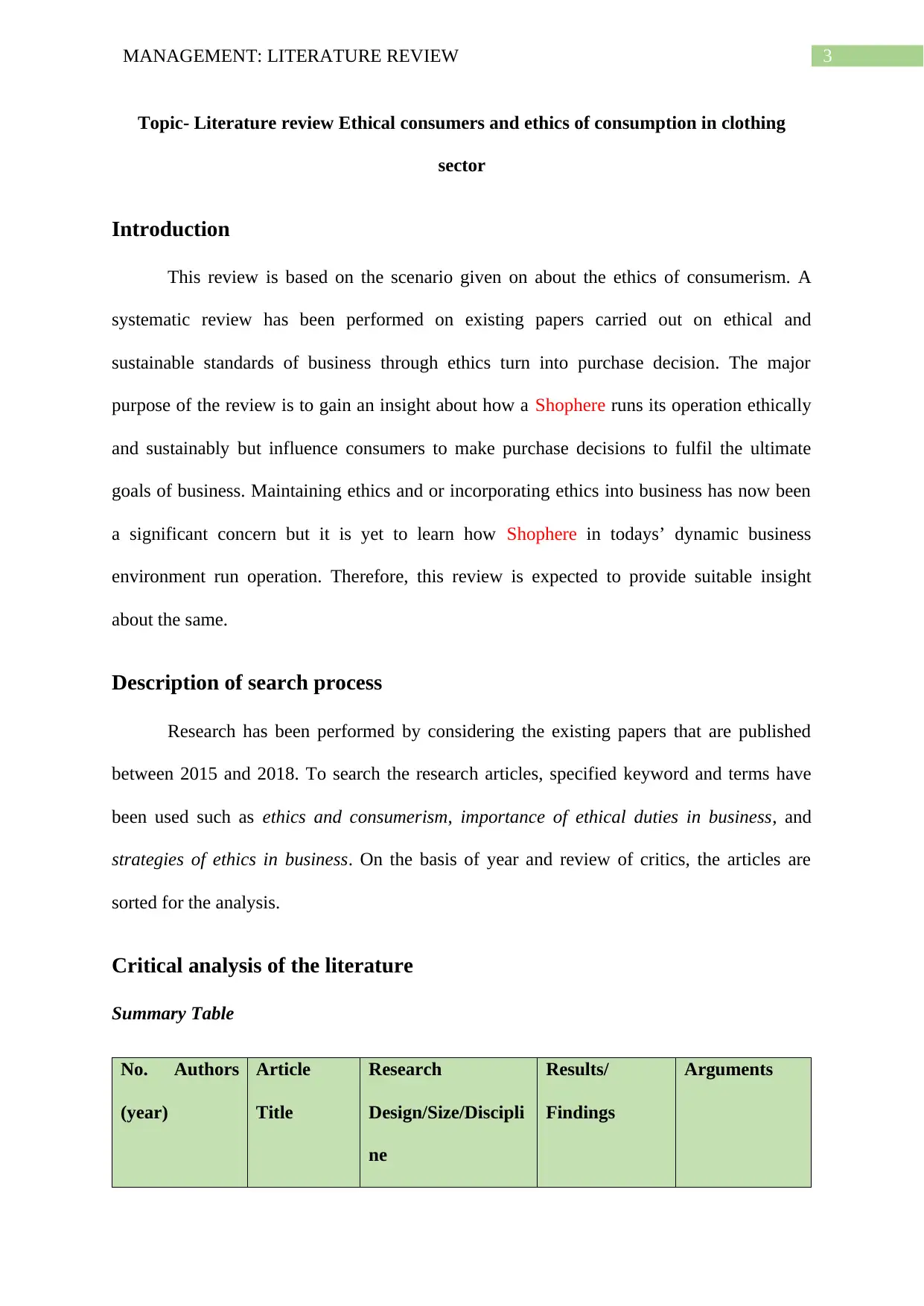
3MANAGEMENT: LITERATURE REVIEW
Topic- Literature review Ethical consumers and ethics of consumption in clothing
sector
Introduction
This review is based on the scenario given on about the ethics of consumerism. A
systematic review has been performed on existing papers carried out on ethical and
sustainable standards of business through ethics turn into purchase decision. The major
purpose of the review is to gain an insight about how a Shophere runs its operation ethically
and sustainably but influence consumers to make purchase decisions to fulfil the ultimate
goals of business. Maintaining ethics and or incorporating ethics into business has now been
a significant concern but it is yet to learn how Shophere in todays’ dynamic business
environment run operation. Therefore, this review is expected to provide suitable insight
about the same.
Description of search process
Research has been performed by considering the existing papers that are published
between 2015 and 2018. To search the research articles, specified keyword and terms have
been used such as ethics and consumerism, importance of ethical duties in business, and
strategies of ethics in business. On the basis of year and review of critics, the articles are
sorted for the analysis.
Critical analysis of the literature
Summary Table
No. Authors
(year)
Article
Title
Research
Design/Size/Discipli
ne
Results/
Findings
Arguments
Topic- Literature review Ethical consumers and ethics of consumption in clothing
sector
Introduction
This review is based on the scenario given on about the ethics of consumerism. A
systematic review has been performed on existing papers carried out on ethical and
sustainable standards of business through ethics turn into purchase decision. The major
purpose of the review is to gain an insight about how a Shophere runs its operation ethically
and sustainably but influence consumers to make purchase decisions to fulfil the ultimate
goals of business. Maintaining ethics and or incorporating ethics into business has now been
a significant concern but it is yet to learn how Shophere in todays’ dynamic business
environment run operation. Therefore, this review is expected to provide suitable insight
about the same.
Description of search process
Research has been performed by considering the existing papers that are published
between 2015 and 2018. To search the research articles, specified keyword and terms have
been used such as ethics and consumerism, importance of ethical duties in business, and
strategies of ethics in business. On the basis of year and review of critics, the articles are
sorted for the analysis.
Critical analysis of the literature
Summary Table
No. Authors
(year)
Article
Title
Research
Design/Size/Discipli
ne
Results/
Findings
Arguments
⊘ This is a preview!⊘
Do you want full access?
Subscribe today to unlock all pages.

Trusted by 1+ million students worldwide
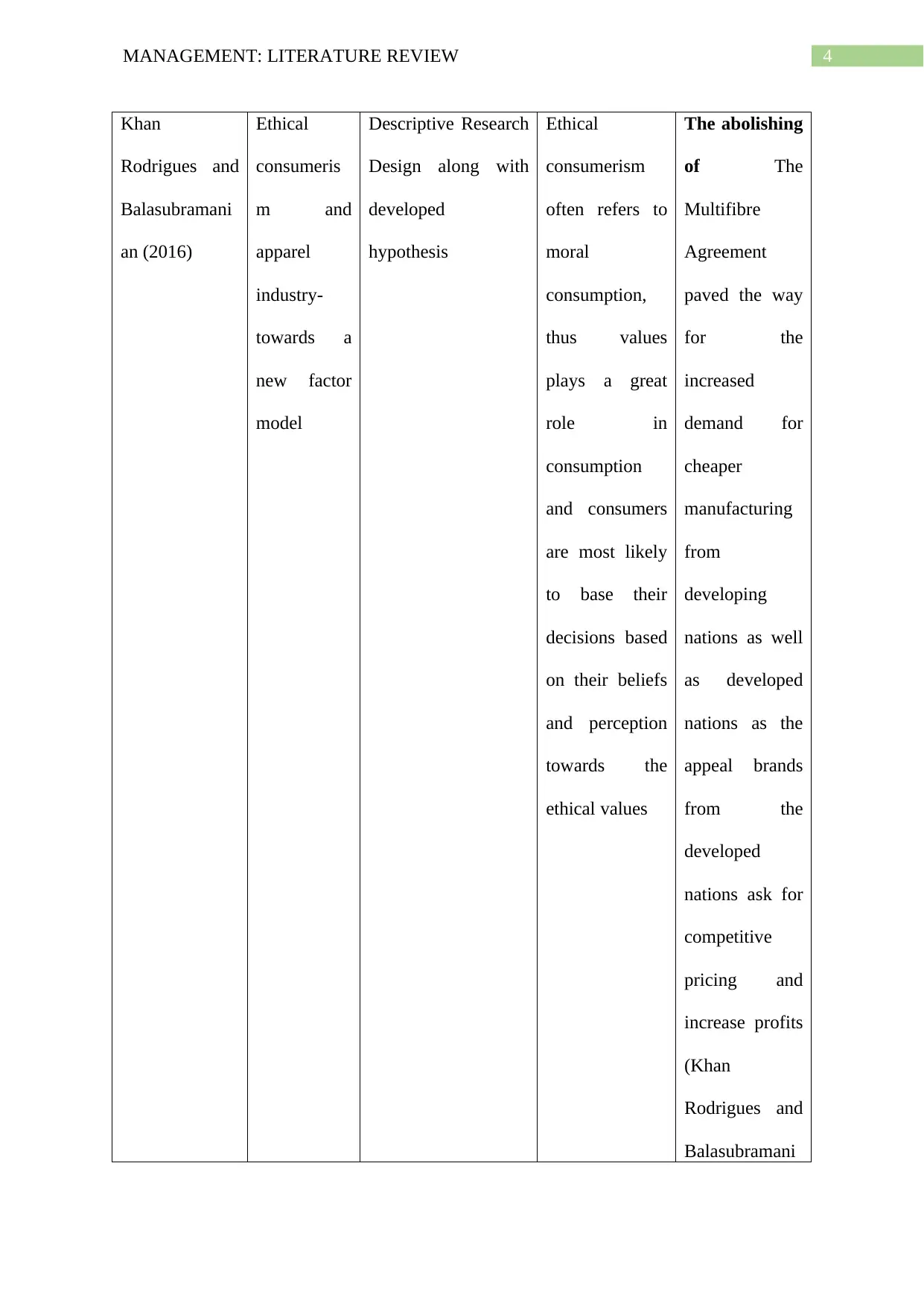
4MANAGEMENT: LITERATURE REVIEW
Khan
Rodrigues and
Balasubramani
an (2016)
Ethical
consumeris
m and
apparel
industry-
towards a
new factor
model
Descriptive Research
Design along with
developed
hypothesis
Ethical
consumerism
often refers to
moral
consumption,
thus values
plays a great
role in
consumption
and consumers
are most likely
to base their
decisions based
on their beliefs
and perception
towards the
ethical values
The abolishing
of The
Multifibre
Agreement
paved the way
for the
increased
demand for
cheaper
manufacturing
from
developing
nations as well
as developed
nations as the
appeal brands
from the
developed
nations ask for
competitive
pricing and
increase profits
(Khan
Rodrigues and
Balasubramani
Khan
Rodrigues and
Balasubramani
an (2016)
Ethical
consumeris
m and
apparel
industry-
towards a
new factor
model
Descriptive Research
Design along with
developed
hypothesis
Ethical
consumerism
often refers to
moral
consumption,
thus values
plays a great
role in
consumption
and consumers
are most likely
to base their
decisions based
on their beliefs
and perception
towards the
ethical values
The abolishing
of The
Multifibre
Agreement
paved the way
for the
increased
demand for
cheaper
manufacturing
from
developing
nations as well
as developed
nations as the
appeal brands
from the
developed
nations ask for
competitive
pricing and
increase profits
(Khan
Rodrigues and
Balasubramani
Paraphrase This Document
Need a fresh take? Get an instant paraphrase of this document with our AI Paraphraser
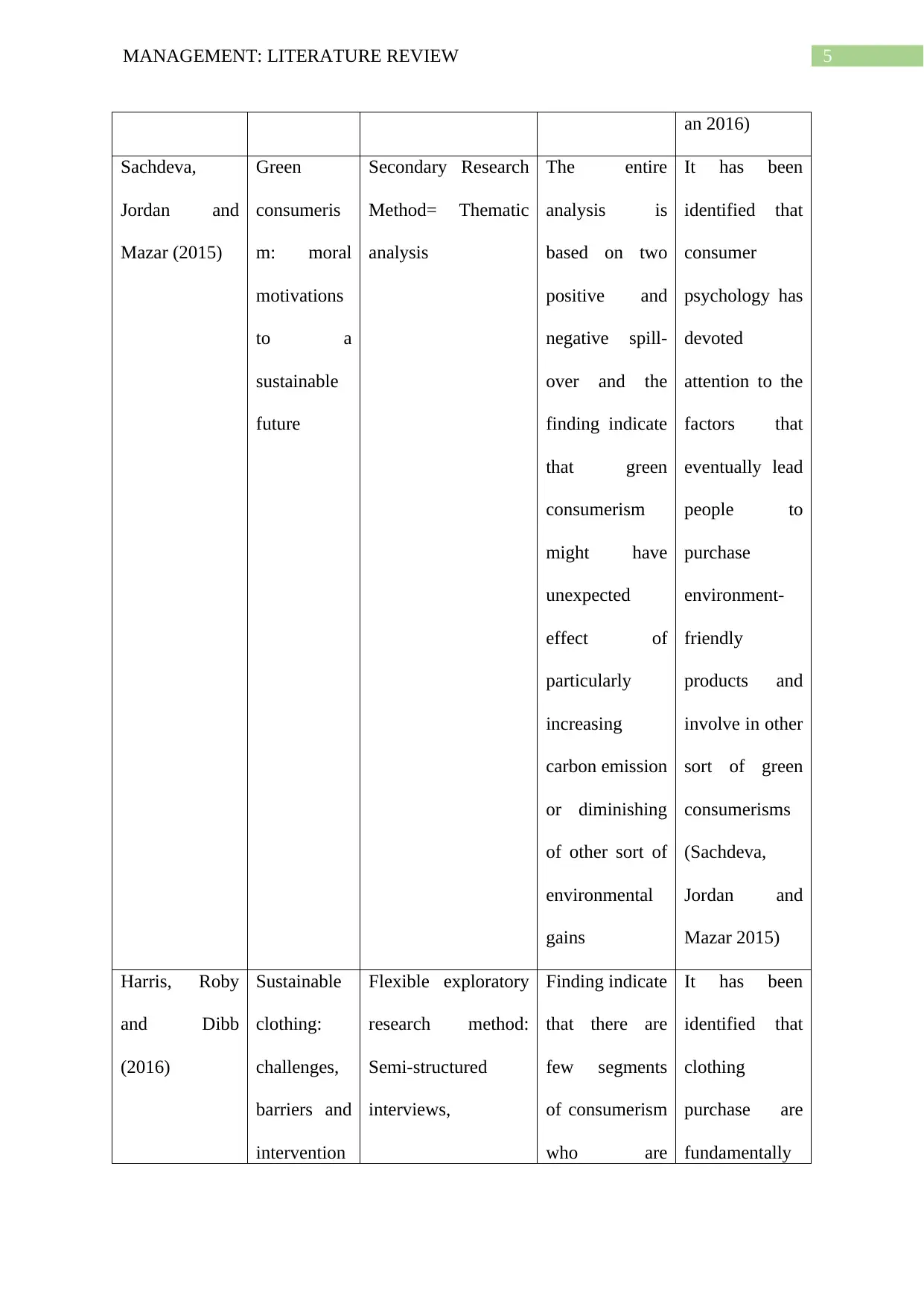
5MANAGEMENT: LITERATURE REVIEW
an 2016)
Sachdeva,
Jordan and
Mazar (2015)
Green
consumeris
m: moral
motivations
to a
sustainable
future
Secondary Research
Method= Thematic
analysis
The entire
analysis is
based on two
positive and
negative spill-
over and the
finding indicate
that green
consumerism
might have
unexpected
effect of
particularly
increasing
carbon emission
or diminishing
of other sort of
environmental
gains
It has been
identified that
consumer
psychology has
devoted
attention to the
factors that
eventually lead
people to
purchase
environment-
friendly
products and
involve in other
sort of green
consumerisms
(Sachdeva,
Jordan and
Mazar 2015)
Harris, Roby
and Dibb
(2016)
Sustainable
clothing:
challenges,
barriers and
intervention
Flexible exploratory
research method:
Semi-structured
interviews,
Finding indicate
that there are
few segments
of consumerism
who are
It has been
identified that
clothing
purchase are
fundamentally
an 2016)
Sachdeva,
Jordan and
Mazar (2015)
Green
consumeris
m: moral
motivations
to a
sustainable
future
Secondary Research
Method= Thematic
analysis
The entire
analysis is
based on two
positive and
negative spill-
over and the
finding indicate
that green
consumerism
might have
unexpected
effect of
particularly
increasing
carbon emission
or diminishing
of other sort of
environmental
gains
It has been
identified that
consumer
psychology has
devoted
attention to the
factors that
eventually lead
people to
purchase
environment-
friendly
products and
involve in other
sort of green
consumerisms
(Sachdeva,
Jordan and
Mazar 2015)
Harris, Roby
and Dibb
(2016)
Sustainable
clothing:
challenges,
barriers and
intervention
Flexible exploratory
research method:
Semi-structured
interviews,
Finding indicate
that there are
few segments
of consumerism
who are
It has been
identified that
clothing
purchase are
fundamentally
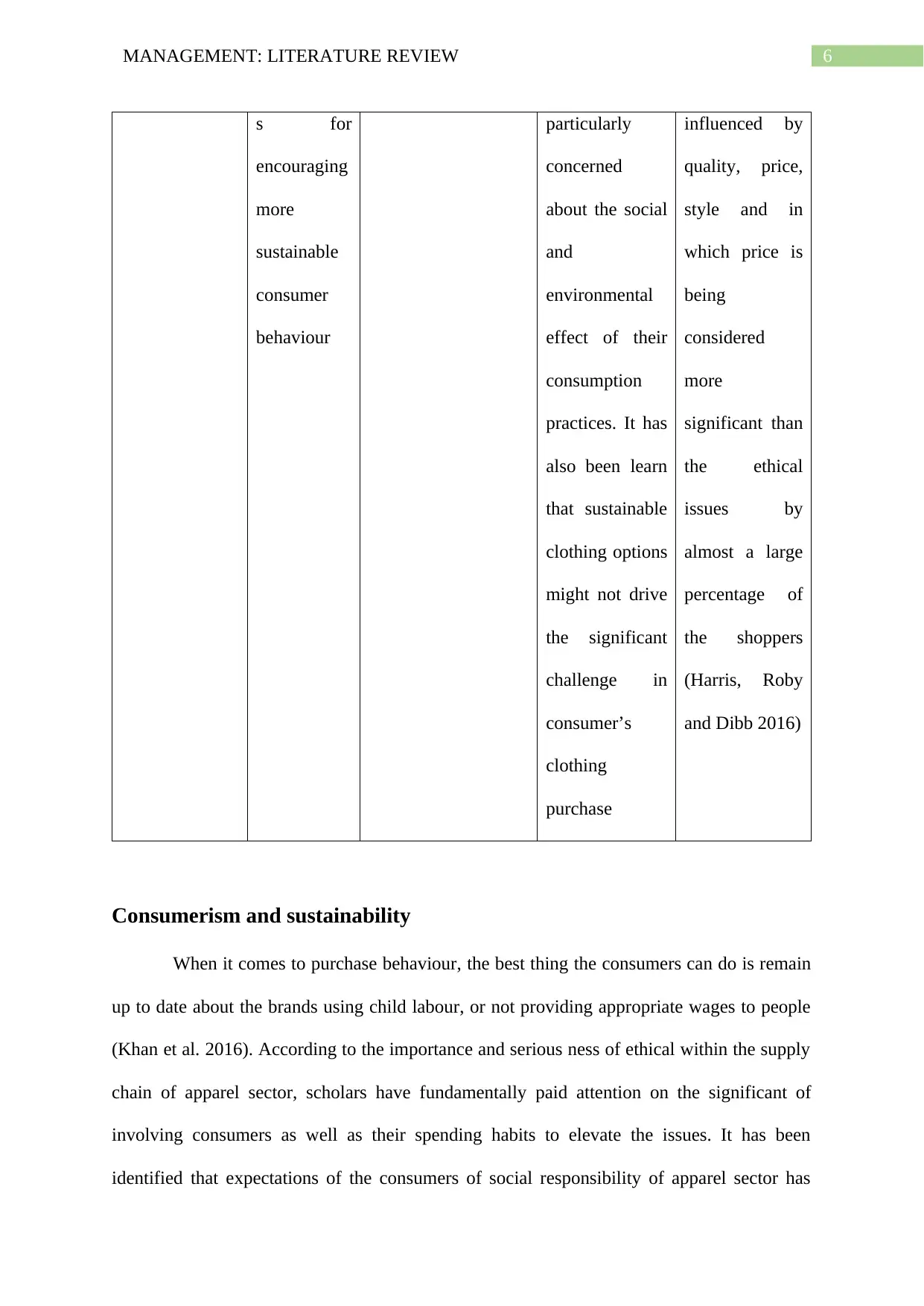
6MANAGEMENT: LITERATURE REVIEW
s for
encouraging
more
sustainable
consumer
behaviour
particularly
concerned
about the social
and
environmental
effect of their
consumption
practices. It has
also been learn
that sustainable
clothing options
might not drive
the significant
challenge in
consumer’s
clothing
purchase
influenced by
quality, price,
style and in
which price is
being
considered
more
significant than
the ethical
issues by
almost a large
percentage of
the shoppers
(Harris, Roby
and Dibb 2016)
Consumerism and sustainability
When it comes to purchase behaviour, the best thing the consumers can do is remain
up to date about the brands using child labour, or not providing appropriate wages to people
(Khan et al. 2016). According to the importance and serious ness of ethical within the supply
chain of apparel sector, scholars have fundamentally paid attention on the significant of
involving consumers as well as their spending habits to elevate the issues. It has been
identified that expectations of the consumers of social responsibility of apparel sector has
s for
encouraging
more
sustainable
consumer
behaviour
particularly
concerned
about the social
and
environmental
effect of their
consumption
practices. It has
also been learn
that sustainable
clothing options
might not drive
the significant
challenge in
consumer’s
clothing
purchase
influenced by
quality, price,
style and in
which price is
being
considered
more
significant than
the ethical
issues by
almost a large
percentage of
the shoppers
(Harris, Roby
and Dibb 2016)
Consumerism and sustainability
When it comes to purchase behaviour, the best thing the consumers can do is remain
up to date about the brands using child labour, or not providing appropriate wages to people
(Khan et al. 2016). According to the importance and serious ness of ethical within the supply
chain of apparel sector, scholars have fundamentally paid attention on the significant of
involving consumers as well as their spending habits to elevate the issues. It has been
identified that expectations of the consumers of social responsibility of apparel sector has
⊘ This is a preview!⊘
Do you want full access?
Subscribe today to unlock all pages.

Trusted by 1+ million students worldwide
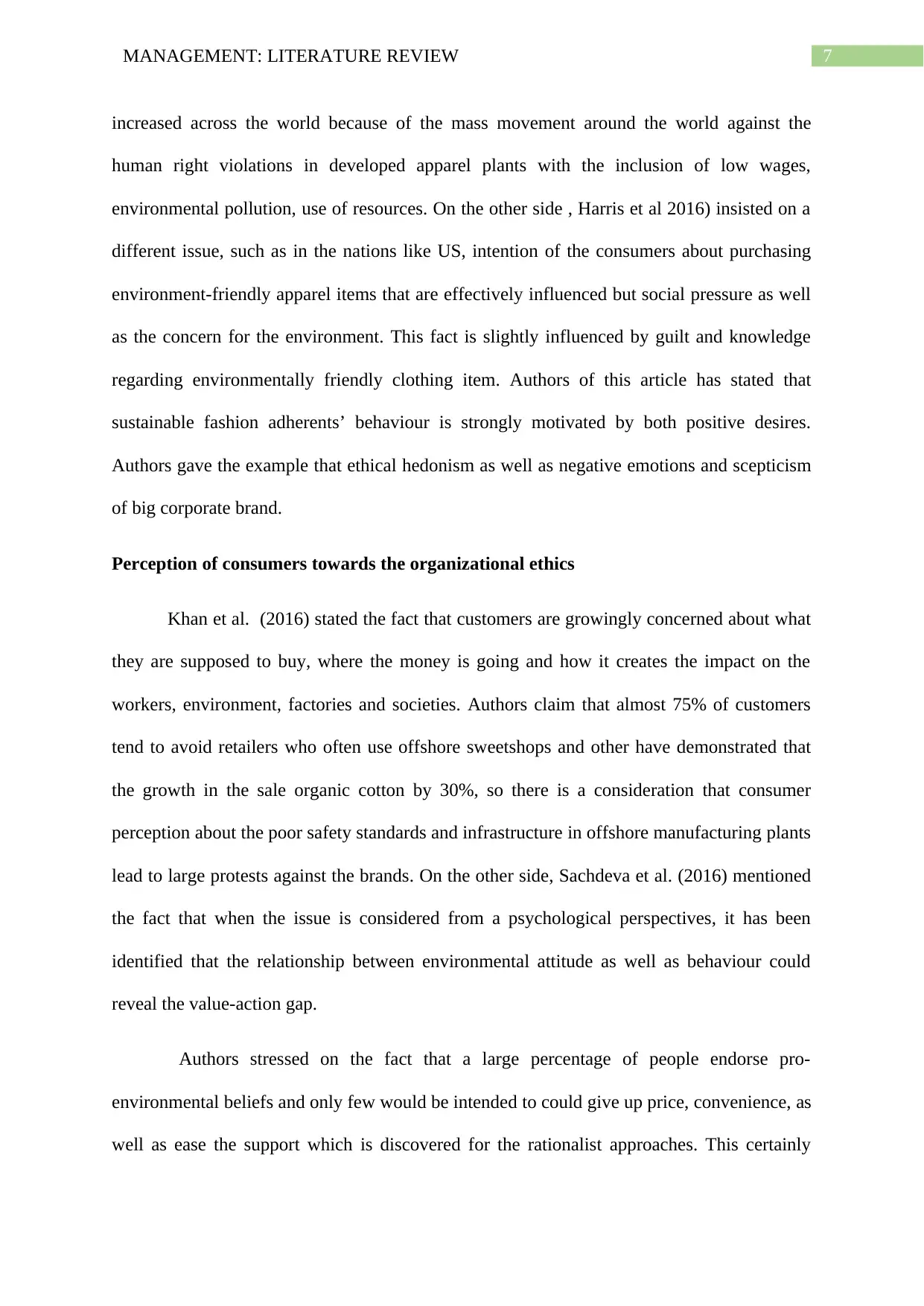
7MANAGEMENT: LITERATURE REVIEW
increased across the world because of the mass movement around the world against the
human right violations in developed apparel plants with the inclusion of low wages,
environmental pollution, use of resources. On the other side , Harris et al 2016) insisted on a
different issue, such as in the nations like US, intention of the consumers about purchasing
environment-friendly apparel items that are effectively influenced but social pressure as well
as the concern for the environment. This fact is slightly influenced by guilt and knowledge
regarding environmentally friendly clothing item. Authors of this article has stated that
sustainable fashion adherents’ behaviour is strongly motivated by both positive desires.
Authors gave the example that ethical hedonism as well as negative emotions and scepticism
of big corporate brand.
Perception of consumers towards the organizational ethics
Khan et al. (2016) stated the fact that customers are growingly concerned about what
they are supposed to buy, where the money is going and how it creates the impact on the
workers, environment, factories and societies. Authors claim that almost 75% of customers
tend to avoid retailers who often use offshore sweetshops and other have demonstrated that
the growth in the sale organic cotton by 30%, so there is a consideration that consumer
perception about the poor safety standards and infrastructure in offshore manufacturing plants
lead to large protests against the brands. On the other side, Sachdeva et al. (2016) mentioned
the fact that when the issue is considered from a psychological perspectives, it has been
identified that the relationship between environmental attitude as well as behaviour could
reveal the value-action gap.
Authors stressed on the fact that a large percentage of people endorse pro-
environmental beliefs and only few would be intended to could give up price, convenience, as
well as ease the support which is discovered for the rationalist approaches. This certainly
increased across the world because of the mass movement around the world against the
human right violations in developed apparel plants with the inclusion of low wages,
environmental pollution, use of resources. On the other side , Harris et al 2016) insisted on a
different issue, such as in the nations like US, intention of the consumers about purchasing
environment-friendly apparel items that are effectively influenced but social pressure as well
as the concern for the environment. This fact is slightly influenced by guilt and knowledge
regarding environmentally friendly clothing item. Authors of this article has stated that
sustainable fashion adherents’ behaviour is strongly motivated by both positive desires.
Authors gave the example that ethical hedonism as well as negative emotions and scepticism
of big corporate brand.
Perception of consumers towards the organizational ethics
Khan et al. (2016) stated the fact that customers are growingly concerned about what
they are supposed to buy, where the money is going and how it creates the impact on the
workers, environment, factories and societies. Authors claim that almost 75% of customers
tend to avoid retailers who often use offshore sweetshops and other have demonstrated that
the growth in the sale organic cotton by 30%, so there is a consideration that consumer
perception about the poor safety standards and infrastructure in offshore manufacturing plants
lead to large protests against the brands. On the other side, Sachdeva et al. (2016) mentioned
the fact that when the issue is considered from a psychological perspectives, it has been
identified that the relationship between environmental attitude as well as behaviour could
reveal the value-action gap.
Authors stressed on the fact that a large percentage of people endorse pro-
environmental beliefs and only few would be intended to could give up price, convenience, as
well as ease the support which is discovered for the rationalist approaches. This certainly
Paraphrase This Document
Need a fresh take? Get an instant paraphrase of this document with our AI Paraphraser
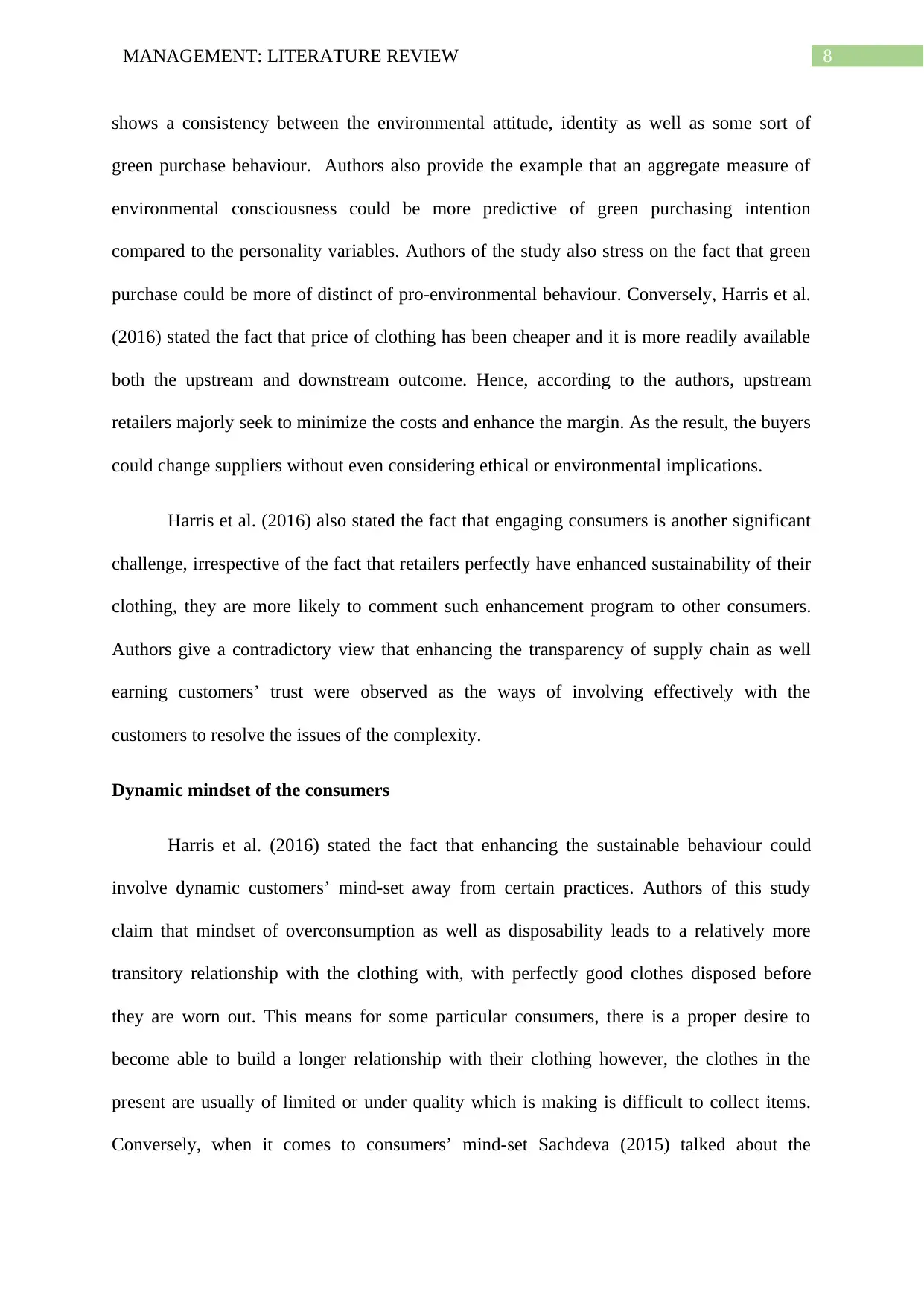
8MANAGEMENT: LITERATURE REVIEW
shows a consistency between the environmental attitude, identity as well as some sort of
green purchase behaviour. Authors also provide the example that an aggregate measure of
environmental consciousness could be more predictive of green purchasing intention
compared to the personality variables. Authors of the study also stress on the fact that green
purchase could be more of distinct of pro-environmental behaviour. Conversely, Harris et al.
(2016) stated the fact that price of clothing has been cheaper and it is more readily available
both the upstream and downstream outcome. Hence, according to the authors, upstream
retailers majorly seek to minimize the costs and enhance the margin. As the result, the buyers
could change suppliers without even considering ethical or environmental implications.
Harris et al. (2016) also stated the fact that engaging consumers is another significant
challenge, irrespective of the fact that retailers perfectly have enhanced sustainability of their
clothing, they are more likely to comment such enhancement program to other consumers.
Authors give a contradictory view that enhancing the transparency of supply chain as well
earning customers’ trust were observed as the ways of involving effectively with the
customers to resolve the issues of the complexity.
Dynamic mindset of the consumers
Harris et al. (2016) stated the fact that enhancing the sustainable behaviour could
involve dynamic customers’ mind-set away from certain practices. Authors of this study
claim that mindset of overconsumption as well as disposability leads to a relatively more
transitory relationship with the clothing with, with perfectly good clothes disposed before
they are worn out. This means for some particular consumers, there is a proper desire to
become able to build a longer relationship with their clothing however, the clothes in the
present are usually of limited or under quality which is making is difficult to collect items.
Conversely, when it comes to consumers’ mind-set Sachdeva (2015) talked about the
shows a consistency between the environmental attitude, identity as well as some sort of
green purchase behaviour. Authors also provide the example that an aggregate measure of
environmental consciousness could be more predictive of green purchasing intention
compared to the personality variables. Authors of the study also stress on the fact that green
purchase could be more of distinct of pro-environmental behaviour. Conversely, Harris et al.
(2016) stated the fact that price of clothing has been cheaper and it is more readily available
both the upstream and downstream outcome. Hence, according to the authors, upstream
retailers majorly seek to minimize the costs and enhance the margin. As the result, the buyers
could change suppliers without even considering ethical or environmental implications.
Harris et al. (2016) also stated the fact that engaging consumers is another significant
challenge, irrespective of the fact that retailers perfectly have enhanced sustainability of their
clothing, they are more likely to comment such enhancement program to other consumers.
Authors give a contradictory view that enhancing the transparency of supply chain as well
earning customers’ trust were observed as the ways of involving effectively with the
customers to resolve the issues of the complexity.
Dynamic mindset of the consumers
Harris et al. (2016) stated the fact that enhancing the sustainable behaviour could
involve dynamic customers’ mind-set away from certain practices. Authors of this study
claim that mindset of overconsumption as well as disposability leads to a relatively more
transitory relationship with the clothing with, with perfectly good clothes disposed before
they are worn out. This means for some particular consumers, there is a proper desire to
become able to build a longer relationship with their clothing however, the clothes in the
present are usually of limited or under quality which is making is difficult to collect items.
Conversely, when it comes to consumers’ mind-set Sachdeva (2015) talked about the
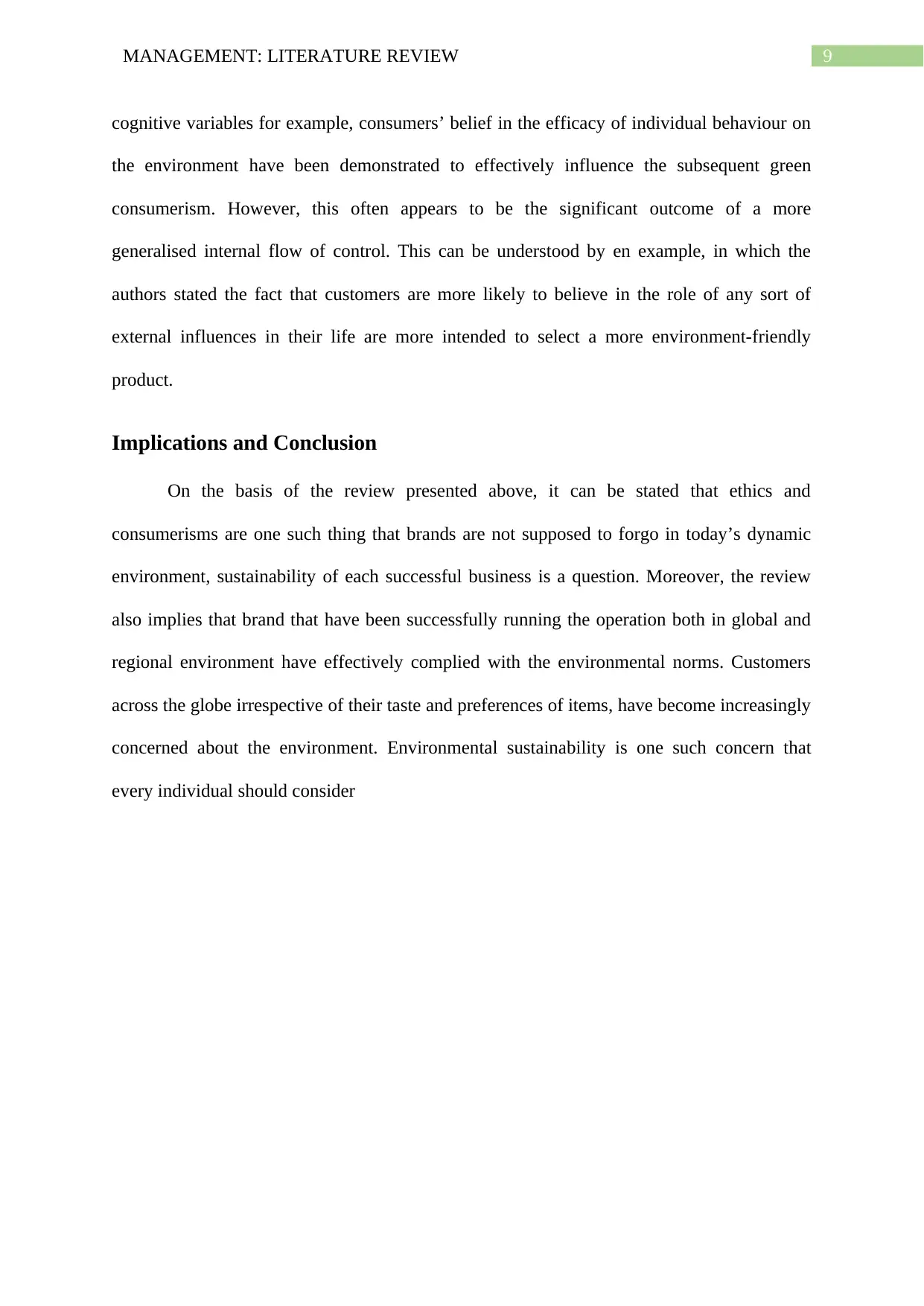
9MANAGEMENT: LITERATURE REVIEW
cognitive variables for example, consumers’ belief in the efficacy of individual behaviour on
the environment have been demonstrated to effectively influence the subsequent green
consumerism. However, this often appears to be the significant outcome of a more
generalised internal flow of control. This can be understood by en example, in which the
authors stated the fact that customers are more likely to believe in the role of any sort of
external influences in their life are more intended to select a more environment-friendly
product.
Implications and Conclusion
On the basis of the review presented above, it can be stated that ethics and
consumerisms are one such thing that brands are not supposed to forgo in today’s dynamic
environment, sustainability of each successful business is a question. Moreover, the review
also implies that brand that have been successfully running the operation both in global and
regional environment have effectively complied with the environmental norms. Customers
across the globe irrespective of their taste and preferences of items, have become increasingly
concerned about the environment. Environmental sustainability is one such concern that
every individual should consider
cognitive variables for example, consumers’ belief in the efficacy of individual behaviour on
the environment have been demonstrated to effectively influence the subsequent green
consumerism. However, this often appears to be the significant outcome of a more
generalised internal flow of control. This can be understood by en example, in which the
authors stated the fact that customers are more likely to believe in the role of any sort of
external influences in their life are more intended to select a more environment-friendly
product.
Implications and Conclusion
On the basis of the review presented above, it can be stated that ethics and
consumerisms are one such thing that brands are not supposed to forgo in today’s dynamic
environment, sustainability of each successful business is a question. Moreover, the review
also implies that brand that have been successfully running the operation both in global and
regional environment have effectively complied with the environmental norms. Customers
across the globe irrespective of their taste and preferences of items, have become increasingly
concerned about the environment. Environmental sustainability is one such concern that
every individual should consider
⊘ This is a preview!⊘
Do you want full access?
Subscribe today to unlock all pages.

Trusted by 1+ million students worldwide
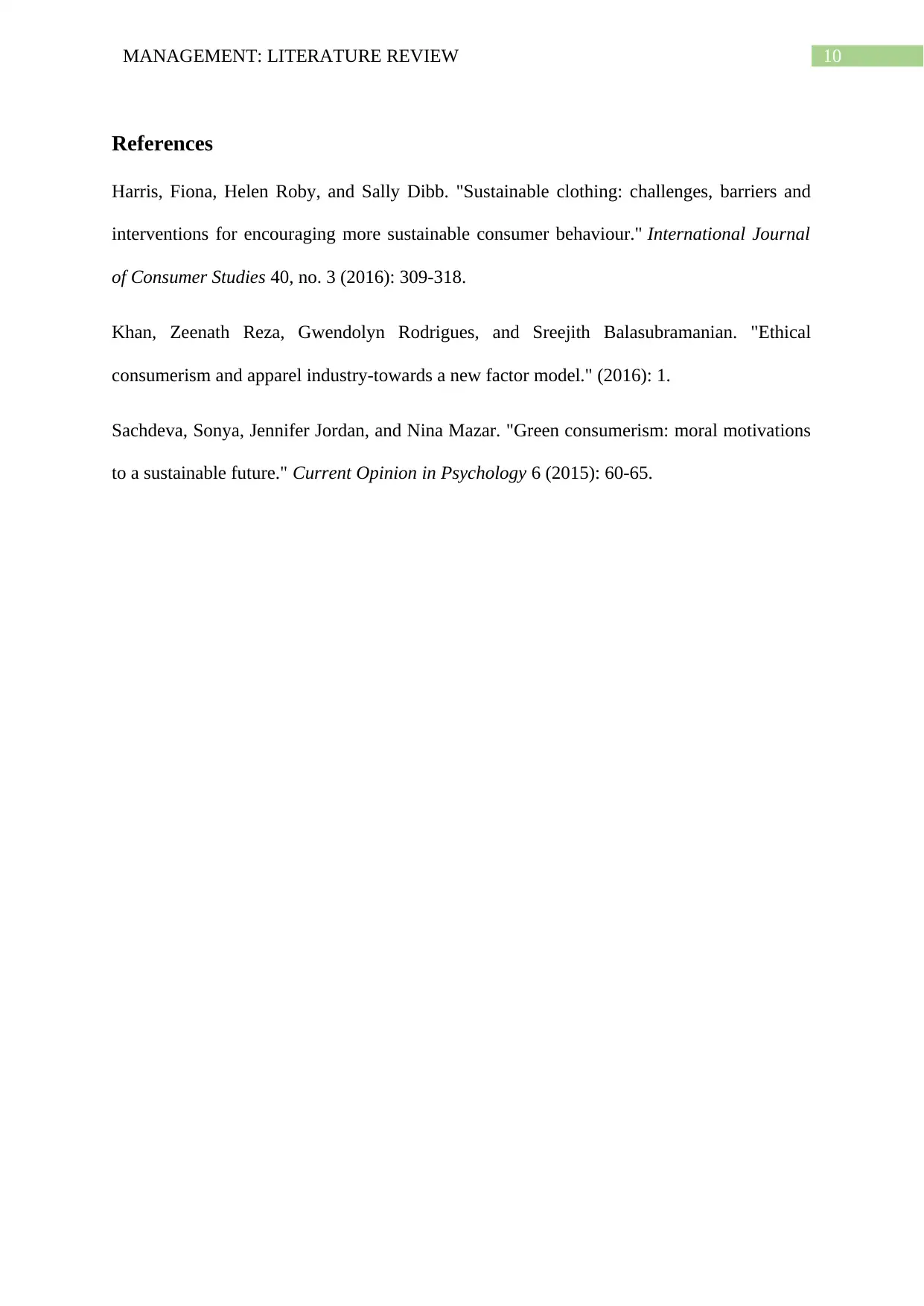
10MANAGEMENT: LITERATURE REVIEW
References
Harris, Fiona, Helen Roby, and Sally Dibb. "Sustainable clothing: challenges, barriers and
interventions for encouraging more sustainable consumer behaviour." International Journal
of Consumer Studies 40, no. 3 (2016): 309-318.
Khan, Zeenath Reza, Gwendolyn Rodrigues, and Sreejith Balasubramanian. "Ethical
consumerism and apparel industry-towards a new factor model." (2016): 1.
Sachdeva, Sonya, Jennifer Jordan, and Nina Mazar. "Green consumerism: moral motivations
to a sustainable future." Current Opinion in Psychology 6 (2015): 60-65.
References
Harris, Fiona, Helen Roby, and Sally Dibb. "Sustainable clothing: challenges, barriers and
interventions for encouraging more sustainable consumer behaviour." International Journal
of Consumer Studies 40, no. 3 (2016): 309-318.
Khan, Zeenath Reza, Gwendolyn Rodrigues, and Sreejith Balasubramanian. "Ethical
consumerism and apparel industry-towards a new factor model." (2016): 1.
Sachdeva, Sonya, Jennifer Jordan, and Nina Mazar. "Green consumerism: moral motivations
to a sustainable future." Current Opinion in Psychology 6 (2015): 60-65.
1 out of 10
Related Documents
Your All-in-One AI-Powered Toolkit for Academic Success.
+13062052269
info@desklib.com
Available 24*7 on WhatsApp / Email
![[object Object]](/_next/static/media/star-bottom.7253800d.svg)
Unlock your academic potential
Copyright © 2020–2026 A2Z Services. All Rights Reserved. Developed and managed by ZUCOL.





